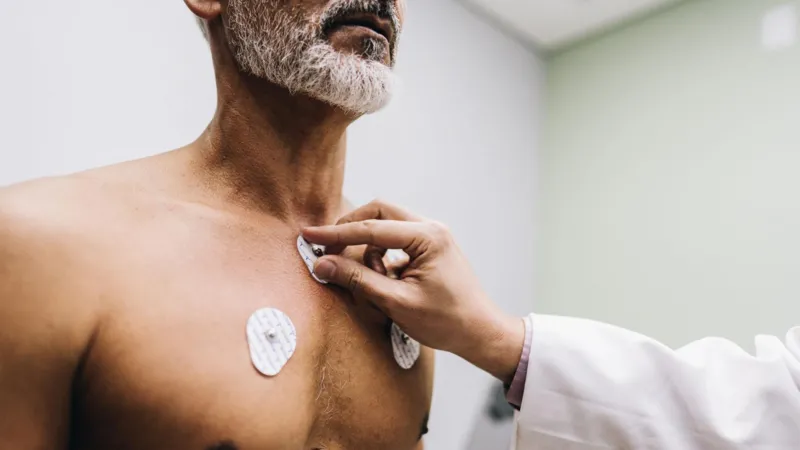Hospitals trial AI to spot type 2 diabetes risk
Two NHS hospital trusts in London are using AI technology to see if they can spot type 2 diabetes in patients up to a decade in advance of the condition occuring.

Imperial College and Chelsea and Westminster hospital NHS foundation trusts have started training the AI system - called Aire-DM - that checks patients' ECG heart traces for subtle early warning signs that are tricky for doctors to otherwise detect.
Clinical trials are planned for 2025 to see if it works as well as is hoped.
Early work suggests the system can spot risk about 70% of the time.
Giving the AI extra details about other background risk factors, such as the patient's age, sex and whether they already have high blood pressure and or are overweight, can improve the predictive power, says lead researcher Dr Fu Siong Ng.
He told BBC News: "It is already quite good just with the ECG data, but it is even better when you add in those."
An ECG (electrocardiogram) records and can reveal problems with the electrical activity of the heart, including the rate and rhythm.
Dr Ng says the ECG changes that the system detects are too varied and subtle for even highly skilled doctors to interpret with the naked eye.
"It's not as simple as saying it's this or that bit of the ECG. It's looking at a combination of subtle things."
As part of the trial up to 1,000 patients at both hospitals will have ECG scans read by the AI system to see if it helps detect and predict disease.
It's not something that will be offered to routinely yet, although the experts hope it could be rolled out more widely on the NHS. That could take five years or more, says Dr Ng.
The British Heart Foundation, which is funding the work, says detecting people at risk of diabetes could ultimately save lives.
Having uncontrolled type 2 diabetes can lead to heart attacks and strokes, for example.
Maintaing a healthy weight and eating a healthy diet and exercising can help protect against complications.
Professor Bryan Williams, Chief Scientific and Medical Officer at the British Heart Foundation, said: "This exciting research uses powerful artificial intelligence to analyse ECGs, revealing how AI can spot things that cannot usually be observed in routinely collected health data. This kind of insight could be a gamechanger in predicting future risk of developing type 2 diabetes, years before the condition begins.
"Type 2 diabetes is a rapidly growing health challenge that increases the risk of developing heart disease, however with the right support it is possible for people to reduce their risk of developing the condition. We look forward to seeing how this technology could be incorporated into clinical practice."
Dr Faye Riley from Diabetes UK said: “Type 2 diabetes often goes undiagnosed, sometimes for many years. With 1.2 million people in England alone unaware they're living with the condition and millions more at high risk of developing it, identifying those at risk early on is crucial.
"AI-powered screening methods offer a promising new way to spot those likely to develop type 2 diabetes years in advance, allowing them to access the right support and prevent serious complications, such as heart failure and sight loss.”
What is type 2 diabetes?
Type 2 diabetes is a common condition where the level of sugar (glucose) in the blood becomes too high.
It happens if the body cannot make enough of, or cannot correctly use, a hormone called insulin, which controls blood sugar.
Some cases are linked to being overweight.
That is because fat can build up in and around the pancreas - the organ that makes insulin.
Type 1 diabetes, meanwhile, is an autoimmune disease.
-BBC






